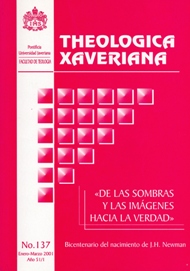Abstract
John Henry Newman (1801-1890) es una de las figuras intelectuales más importantes del siglo XIX. Su pensamiento y su obra pedagógica se expresan mejor en su concepción y experiencia sobre la universidad. Newman afirma que la formación intelectual para el desarrollo del conocimiento es la finalidad principal de la educación. El conocimiento es un bien en sí mismo y como tal, un fin, no sólo un medio. El tema del conocimiento vuelve a adquirir relevancia en este siglo XXI, considerado, precisamente, como el siglo de la educación y del conocimiento. La mayor novedad de la propuesta de Newman está en concebir la universidad como un espacio para la educación (formación) antes que para la instrucción. Se puede anotar que la concepción de Newman acerca de la formación intelectual
responde a su concepción del conocimiento y particularmente a su teoría del «asentimiento real», considerada como uno de sus mayores aportes a la gnoseología moderna.
This journal is registered under a Creative Commons Attribution 4.0 International Public License. Thus, this work may be reproduced, distributed, and publicly shared in digital format, as long as the names of the authors and Pontificia Universidad Javeriana are acknowledged. Others are allowed to quote, adapt, transform, auto-archive, republish, and create based on this material, for any purpose (even commercial ones), provided the authorship is duly acknowledged, a link to the original work is provided, and it is specified if changes have been made. Pontificia Universidad Javeriana does not hold the rights of published works and the authors are solely responsible for the contents of their works; they keep the moral, intellectual, privacy, and publicity rights.
Approving the intervention of the work (review, copy-editing, translation, layout) and the following outreach, are granted through an use license and not through an assignment of rights. This means the journal and Pontificia Universidad Javeriana cannot be held responsible for any ethical malpractice by the authors. As a consequence of the protection granted by the use license, the journal is not required to publish recantations or modify information already published, unless the errata stems from the editorial management process. Publishing contents in this journal does not generate royalties for contributors.


